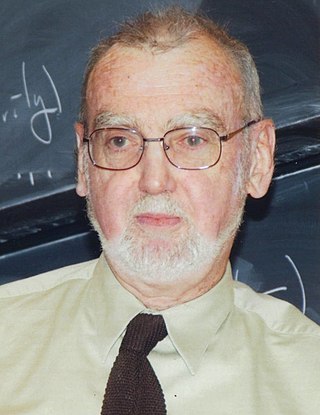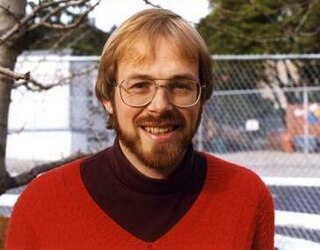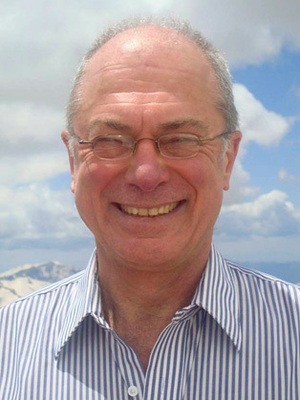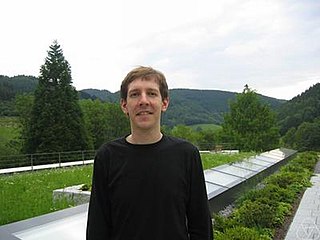Related Research Articles

Robert Phelan Langlands, is a Canadian mathematician. He is best known as the founder of the Langlands program, a vast web of conjectures and results connecting representation theory and automorphic forms to the study of Galois groups in number theory, for which he received the 2018 Abel Prize. He was an emeritus professor and occupied Albert Einstein's office at the Institute for Advanced Study in Princeton, until 2020 when he retired.
The modularity theorem states that elliptic curves over the field of rational numbers are related to modular forms. Andrew Wiles proved the modularity theorem for semistable elliptic curves, which was enough to imply Fermat's Last Theorem. Later, a series of papers by Wiles's former students Brian Conrad, Fred Diamond and Richard Taylor, culminating in a joint paper with Christophe Breuil, extended Wiles's techniques to prove the full modularity theorem in 2001.
Gorō Shimura was a Japanese mathematician and Michael Henry Strater Professor Emeritus of Mathematics at Princeton University who worked in number theory, automorphic forms, and arithmetic geometry. He was known for developing the theory of complex multiplication of abelian varieties and Shimura varieties, as well as posing the Taniyama–Shimura conjecture which ultimately led to the proof of Fermat's Last Theorem.
In mathematics, the Sato–Tate conjecture is a statistical statement about the family of elliptic curves Ep obtained from an elliptic curve E over the rational numbers by reduction modulo almost all prime numbers p. Mikio Sato and John Tate independently posed the conjecture around 1960.

Richard Lawrence Taylor is a British mathematician working in the field of number theory. He is currently the Barbara Kimball Browning Professor in Humanities and Sciences at Stanford University.

Yuval Zvi Flicker is an American mathematician. His primary research interests include automorphic representations.
In mathematics, the local Langlands conjectures, introduced by Robert Langlands, are part of the Langlands program. They describe a correspondence between the complex representations of a reductive algebraic group G over a local field F, and representations of the Langlands group of F into the L-group of G. This correspondence is not a bijection in general. The conjectures can be thought of as a generalization of local class field theory from abelian Galois groups to non-abelian Galois groups.
In the mathematical theory of automorphic forms, the fundamental lemma relates orbital integrals on a reductive group over a local field to stable orbital integrals on its endoscopic groups. It was conjectured by Robert Langlands (1983) in the course of developing the Langlands program. The fundamental lemma was proved by Gérard Laumon and Ngô Bảo Châu in the case of unitary groups and then by Ngô (2010) for general reductive groups, building on a series of important reductions made by Jean-Loup Waldspurger to the case of Lie algebras. Time magazine placed Ngô's proof on the list of the "Top 10 scientific discoveries of 2009". In 2010, Ngô was awarded the Fields Medal for this proof.
In mathematics, the André–Oort conjecture is a problem in Diophantine geometry, a branch of number theory, that can be seen as a non-abelian analogue of the Manin–Mumford conjecture, which is now a theorem. The conjecture concerns itself with a characterization of the Zariski closure of sets of special points in Shimura varieties. A special case of the conjecture was stated by Yves André in 1989 and a more general statement was conjectured by Frans Oort in 1995. The modern version is a natural generalization of these two conjectures.
Sophie Morel is a French mathematician, specializing in number theory. She is a CNRS directrice de recherches in mathematics at École normale supérieure de Lyon. In 2012 she received one of the ten prizes of the European Mathematical Society.
Ana Caraiani is a Romanian-American mathematician, who is a Royal Society University Research Fellow and Professor of Pure Mathematics at Imperial College London. Her research interests include algebraic number theory and the Langlands program.

Bernd Siebert is a German mathematician who researches in algebraic geometry.
Erez M. Lapid is an Israeli mathematician, specializing in automorphic forms, L-functions, representation theory, and the Selberg–Arthur trace formula.

Ritabrata Munshi is an Indian mathematician specialising in number theory. He was awarded the Shanti Swarup Bhatnagar Prize for Science and Technology, the highest science award in India, for the year 2015 in mathematical science category.
Laurent Clozel is a French mathematician. His mathematical work is in the area of automorphic forms, including major advances on the Langlands programme

Xinyi Yuan is a Chinese mathematician who is currently a professor of mathematics at Peking University working in number theory, arithmetic geometry, and automorphic forms. In particular, his work focuses on arithmetic intersection theory, algebraic dynamics, Diophantine equations and special values of L-functions.

Kari Kaleva Vilonen is a Finnish mathematician, specializing in geometric representation theory. He is currently a professor at the University of Melbourne.
Jack A. Thorne is a British mathematician working in number theory and arithmetic aspects of the Langlands Program. He specialises in algebraic number theory.
Don Malcolm Blasius is an American mathematician.

Francesco Damien "Frank" Calegari is a professor of mathematics at the University of Chicago working in number theory and the Langlands program.
References
- 1 2 3 4 5 6 7 "Curriculum Vitae (Sug Woo Shin)" (PDF). January 2021. Retrieved March 10, 2021.
- ↑ "Sug Woo Shin". International Mathematical Olympiad . Retrieved March 10, 2021.
- ↑ Sug Woo Shin at the Mathematics Genealogy Project
- ↑ "Sug Woo Shin". University of California, Berkeley . Retrieved December 30, 2020.
- ↑ Harris, M. (2011). "An introduction to the stable trace formula". In Clozel, L.; Harris, M.; Labesse, J.-P.; Ngô, B. C. (eds.). The stable trace formula, Shimura varieties, and arithmetic applications. Vol. I: Stabilization of the trace formula. Boston: International Press. pp. 3–47. ISBN 978-1-57146-227-5.
- ↑ Shin, Sug Woo (2011). "Galois representations arising from some compact Shimura varieties". Annals of Mathematics . Second Series. 173 (3): 1645–1741. doi: 10.4007/annals.2011.173.3.9 . ISSN 0003-486X.
- ↑ Carayol's Bourbaki seminar of 17 June 2007
- ↑ Barnet-Lamb, Thomas; Geraghty, David; Harris, Michael; Taylor, Richard (2011). "A family of Calabi–Yau varieties and potential automorphy. II". Publ. Res. Inst. Math. Sci. 47 (1): 29–98. doi: 10.2977/PRIMS/31 . MR 2827723.